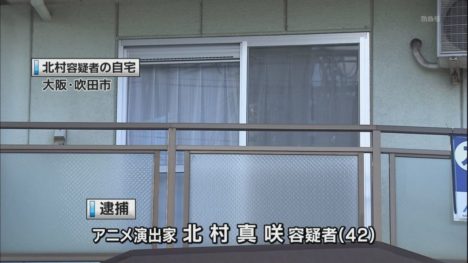Police have released one of Sunrise’s anime directors after arresting him for threatening to go on a killing spree in Osaka’s otaku district, having ignored his protestations of innocence whilst doggedly maintaining “we have proof – your IP address!” – only to discover his PC was being remotely controlled by a virus inflicted on him by 2ch.
42-year-old Masaki Kitamura, an anime director with Sunrise whose many credits include Gundam 00, Tiger & Bunny and Planetes, was originally arrested for making a criminal threat to commit indiscriminate violence (“I’ll kill lots of people at Otaroad!”) via a form on the Osaka city homepage.
Elite cybercrimes investigators with the Osaka police force could not believe their luck upon discovering that the threats made no attempt to conceal their sender’s identity, and promptly arrested and charged him with interfering with the activities of a public official.
The fact he made the “threat” using his real name has been pointed out as a dead give-away that something was amiss, but Osaka police were having none of it and attempted to coerce him into confessing anyway, telling him “we have proof called your IP address!”
Police did notice he had also incorrectly spelled his own name (using an incorrect reading of the kanji in question) in the threatening mails, but again decided to press charges anyway.
They could also find no evidence he had ever visited the Osaka city homepage on his computer (and missed the fact his computer was infected with a virus), but put it down to him cunningly destroying evidence of his crimes.
Investigators eventually managed to establish that his PC had been infected with a virus, and decided to release him. Several weeks elapsed between his initial arrest and police managing to determine he was innocent, although it is not clear how long he spent incarcerated.
It is thought the virus found its way onto his new purchased second-hand PC after he downloaded some free software from a link he found on 2ch, which as it turned out harboured a virus which enabled an unknown attacker to remotely control his PC.
Such viruses are commonly circulated on 2ch and elsewhere, and information and screenshots pillaged from the PCs of victims are often shared on the shadier parts of the Japanese Internet.
2ch itself is subject to almost no moderation, and is consequently overflowing with spam and viruses of all kinds thanks to this and its “anonymous” character, although police are still fastidious about arresting those who make threats on it if they are foolish enough to do so under an untraceable IP.
Kitamura explained that he repeatedly protested his innocence during their interrogation, all to no avail:
“I had never heard of the ‘ota-road’ I was accused of mentioning in the threat, and I’d never even visited the city’s homepage.”
“I told them there was no doubt the mail was made by someone else, and that I had no idea what the contents were.”
Police instead only insisted “we have your IP!” and “if you admit you did it you’ll get a lighter punishment.”
He says he is “relieved to finally have been released after what was a very tough ordeal, but I’m frightened each time the police contact me.”
Some reports initially declined to reveal his name, although enough did reveal it that there was widespread disbelief amongst anime fans that he could be responsible. After his release he indicated to the media that he would prefer they use his real name.
Police, after finally accepting their suspect was in fact completely innocent, have belatedly begun an investigation of the software in question, a free timekeeping application which was operated by unknown parties using overseas servers (although given that the threat was in Japanese and delivered to a very specific target, Japanese hackers seem the most likely culprits).
The investigators responsible have only conceded that “if people say the investigation was deficient it can’t be helped” and “we even thought he was trying to provoke us by using his real name and deleting the evidence thinking we would not be able to pin it on him.”
In what may not be a coincidence, Tokyo police also admitted they released a 28-year-old man (from Fukuoka at the other end of the country) for sending threats to a Tokyo kindergarten, after discovering his PC was infected with a similar virus – although in this case they had already managed to wring a confession out of him.
They are just as grudging about admitting the innocence of a suspect in this case: “We don’t know if his PC really was being manipulated, but we released him to be on the safe side.”
A similar case and recent release occurred in Mie prefecture, suggesting that police may only just have worked out that convictions based solely on IP addresses and forced confessions may not be amongst the most reliable.
Online there is not much doubt about how Japanese police get most of their convictions:
“They are never going to live down the stuff about ‘we have your IP, it’s proof!'”
“I’m not confident I could stop myself from laughing if a cop came out with that to me.”
“They ought to sack these dregs who think an IP address is somehow direct proof of a crime.”
“How can they have someone with this level of knowledge investigating cybercrimes?”
“Terrifying that they have these types investigating sophisticated crimes.”
“If an IP address could assure guilt like that we wouldn’t need all these cops.”
“Giving these imbeciles the power of arrest is frightening.”
“You think these guys are smart? They are high school educated at best.”
“This is how they get confessions from all those supposed perverts.”
“People think the cops are somehow on the side of justice, when in fact they are just the state’s gangster enforcers.”
“A clear and unconstitutional violation of the rights of a suspect.”
“They get all their convictions by saying they’ll be lenient if they get a confession and lying about witnesses.”
“Somebody probably told them an IP address is like a digital fingerprint.”







No need for Celestial Being to destroy 2ch server. Ahahahaha !!
Like I have said for years now: IP Address /= to a specific person nor computer.
Ugh, I hope his career isn’t damaged by this!
Fuckin PO PO. FUCKIN HAXOR SCUM
He is a man. All men are considered guilty in Osaka until proven otherwise.
I knew he was innocent all along.